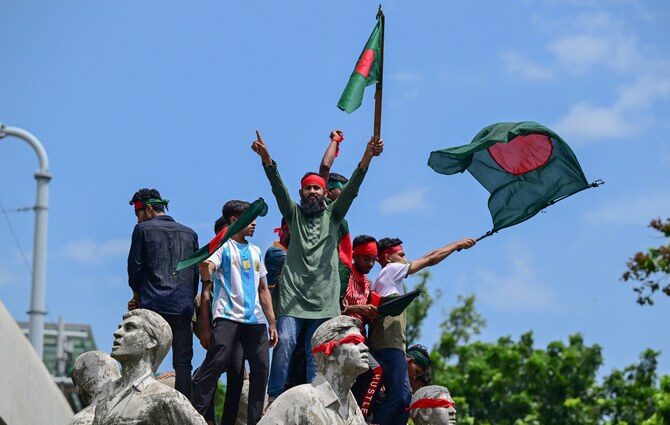DHAKA( WNAM MONITORING: : The Bangladesh military was deployed to the streets to impose an indefinite nationwide curfew on Sunday as protesters clashed with authorities amid a new wave of demonstrations demanding the prime minister’s resignation, which comes weeks after a deadly crackdown.
Thousands of Bangladeshi protesters took to the streets of Dhaka on Saturday and Sunday, as student leaders launched a nationwide civil disobedience campaign to demand the resignation of Prime Minister Sheikh Hasina.
The fresh protests came after earlier demonstrations in July, which began with students calling for an end to a quota system for government jobs, escalated into violence.
Those nationwide campus rallies were attacked by pro-government groups, leading to clashes with security forces, a week-long communications blackout, a curfew, and more than 200 deaths.
After demonstrators returned to the streets in what appeared to be the biggest numbers yet, Bangladesh’s Interior Ministry said an indefinite nationwide curfew would start at 6 p.m. on Sunday, while internet services were again shut down.
More than 50 people were killed and scores were injured in the new round of clashes, according to the country’s leading Bengali-language Prothom Alo newspaper, as police fired tear gas and lobbed stun grenades to disperse the tens of thousands of protesters.
Students Against Discrimination, one of the main groups behind the initial protests, has called on “students from all over the country to travel to Dhaka” on Monday.
“The time has come to make the final signature of this student citizen uprising. Come to Dhaka to be a part of history,” Asif Mahmud, a coordinator of the group, said in a statement issued after the curfew was announced.
“Students will create a new Bangladesh.”
While the Supreme Court eventually scrapped most of the quota to open civil service positions to candidates based on merit, the government’s response to the demonstrations last month and the arrest of thousands of people have turned the student-led protests into a public movement, with more groups joining in the last few days, including teachers and TV stars.
“The current situation is best described as a massive popular uprising. It enjoys support from the whole nation, except a few beneficiaries of the regime,” Salimullah Khan, political analyst and professor at the University of Liberal Arts Bangladesh, told Arab News.
“Repressive measures are solely responsible for these mass murders and crimes against humanity. The true conclusion is in the immediate exit of the regime. Dithering will only cost more lives.”
The protests have become a major challenge for Hasina, who returned to power for a fourth consecutive term in January in an election boycotted by her main opponents, including the Bangladesh Nationalist Party.
“The BNP resolutely supports the students’ demands and pledges and stands by them unwaveringly,” Mohammed Nawshad Zamir, BNP international secretary, told Arab News.
“Therefore, we must persist in our street demonstrations until the illegitimate regime of Sheikh Hasina is ousted and a national government of consensus is established.”
Hasina’s party, the ruling Awami League, said the student-led movement has been “politicized.”
Khalid Mahmud Chowdhury, an Awami League parliamentarian, told Arab News: “It’s a conspiracy to destroy the country. With the current situation, it has been proved now.
“Our law enforcers are still showing maximum tolerance to the protesters. But they have to understand, it doesn’t mean we are weak.”
Yet efforts to suppress the civil movement in Bangladesh, which included “random and disproportionate use of force by the law-enforcing agencies,” were at a scale “never seen before,” said Dr. Iftekharuzzaman, executive director at Transparency International Bangladesh.
“It’s quite ominous. Unfortunately, we see there is no way out of this situation or light at the end of the tunnel because the use of force to manage the crisis continues,” he told Arab News.
“Authorities ignored the power of the students’ movement, and on the other hand, authorities considered themselves invincible … They failed to realize that the students’ movement is invincible here in the history of Bangladesh.”


